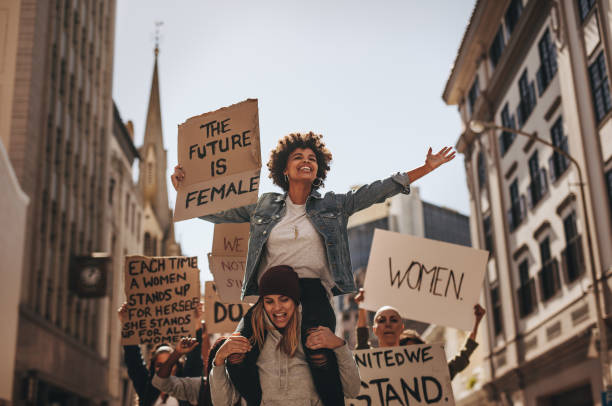Women’s History Month
Why talking about it still matters
Group of female protesters marching on the road with signboards and smiling. Women holding protest banners and marching outdoors.
March 26, 2021
March is Women’s History Month, a month dedicated to remembering the perseverance and strength of the women who fought for gender equality. Some of the most important events in history have been the product of courageous, resilient women; like Harriet Tubman, who led black slaves through the Underground Railroad to safety; Marsha P. Johnson and Sylvia Rae Rivera, the drag queens who first resisted the police at Stonewall Inn and sparked the Gay Rights Movement; and activists Malala Yousafzai and Greta Thunberg, who brought attention to problems like the lack of female education and increasing climate change.
The reason why it’s crucial to talk about gender equality and its history is that we still haven’t reached the end. This March, a study from the United Nations Entity for Gender Equality and the Empowerment of Women came out revealing that 97% of women in the United Kingdom age 18-24 are victims of sexual assault. As a result, the statistic became a huge topic on social media, which was great because women in the 97% united, and the issue gained awareness; however, it obviously wasn’t all well. Viral posts came out of men saying either a) the numbers were fake or overexaggerated, b) assault is the victim’s fault or c) rape is an inevitable part of life that women need to accept. Another opinion from men was that women need to stop saying “all men” are bad or that they’re afraid of “all men.” In response to this, women gave analogies like “there is a 1 in 3.75 million chance you’ll be eaten by a shark, but you’re still scared of all sharks.”
The thing is that 1 in 5 American women will be the victim of an attempted or completed rape at some point in their lifetime. 63% of sexual assaults are not reported to the police because the victim is too ashamed or afraid of not being taken seriously. In the media especially, women are sexualized and objectified, and then ridiculed when they embrace their bodies and sexuality.
Women’s History Month is about women’s empowerment and solidarity. The fact that this year it has been spent fighting sexism and ignorance instead of celebrating is incredibly disheartening. If we are all born equal, then we must treat each other as such.
For a list of resources ranging from sexual assault to street harassment and queer organizations, visit https://wcc.stanford.edu/resources/feminist-websites-blogs-and-resources.





